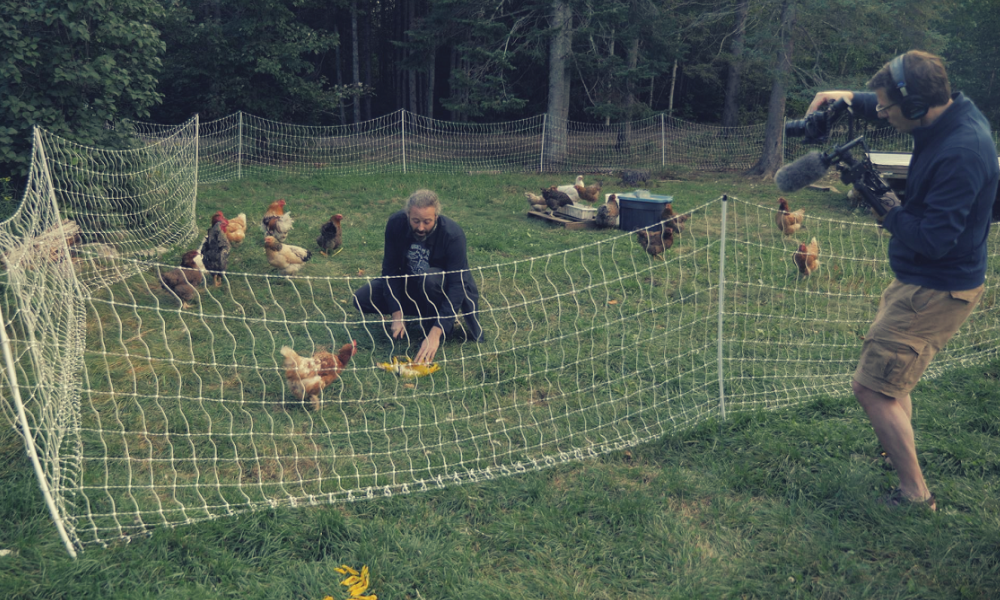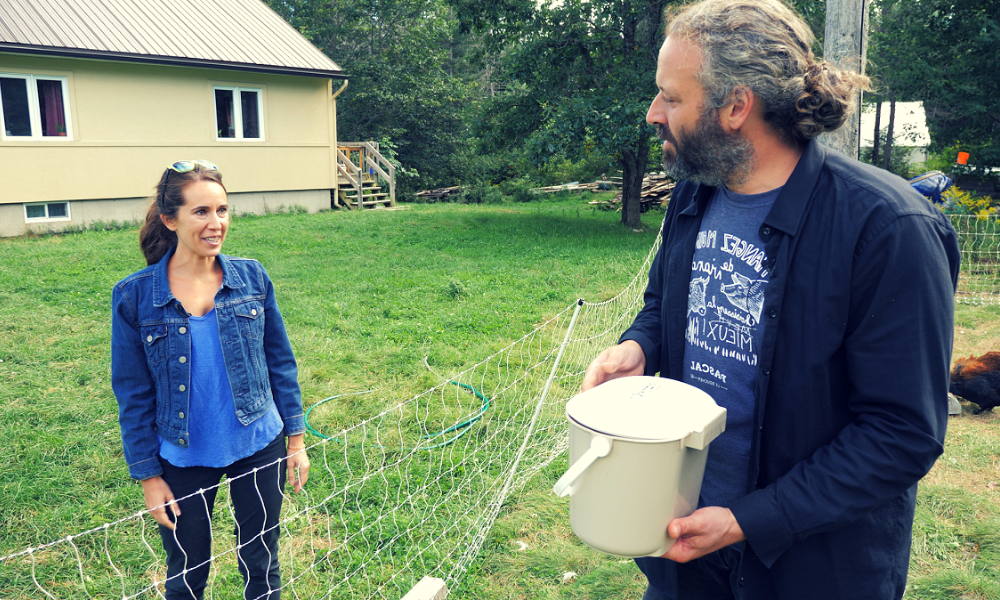U of Ottawa Law's Jurivision visits artisanal farm to examine small-scale farming and regulations

In Jurivision’s first foray into documentary filmmaking, law prof Sarah Berger Richardson and filmmaker Étienne Trépanier visited an artisanal farm in Quebec to get an account of the obstacles that keep smaller farmers from being able to sell their goods to consumers, and how small farms operate.
The resulting half-hour French-language documentary, “The Right to Farm– Artisanal production and its legislative framework in Quebec,” features an interview with artisanal producer Dominic Lamontagne, author of the book La ferme impossible (The Impossible Farm), and provides a close-up look at small-scale farming, as well as the myriad regulations accompanying the production and sale of the food and beverages we consume every day.
“It's a subject that's interesting to people,” says Berger Richardson, a University of Ottawa Civil Law assistant professor whose research is focussed on food law and policy. “It's something that resonates with people who aren't legal academics or lawyers.”
Jurivision is a digital platform launched in February at the University of Ottawa in collaboration with Canada’s Department of Justice, to showcase and share legal knowledge through documentary-style vlogs and films. Berger Richardson wanted to turn her doctoral dissertation on the regulation of good food systems into something that could reach a broader audience, she says, and in a class she took with Étienne Trépanier, visiting lawyer-filmmaker and special advisor in Visual Legal Advocacy in the Faculty of Civil Law – who also led the production of the video – the seed was planted for the documentary.
The film examines issues such as slaughter regulations and the barriers they present for producers, says Berger Richardson. British Columbia has been reviewing its own regulations on the slaughter of livestock, and Alberta has only recently allowed on-farm slaughter, she adds. Different jurisdictions are considering tiered regulation as “consumers are asking questions about where their food comes from.”
The film premiered on YouTube and Facebook on Monday and was followed by an academic roundtable discussion led by Berger Richardson. A full transcript of the film, with infographics, is also available in English.
The agricultural system of supply management aims to balance supply and demand for certain agricultural products by limiting the quantities that can be produced, the film’s website describes. The total amount is divided into shares between the province’s farmers, referred to as ‘quota.’ But producers who wish to raise a limited number of animals outside of the supply management system in order to sell directly to consumers and local markets run into problems; buying ‘quota’ is expensive just one of many expenses required to start a commercial farm.
“Participation in the quota system also dictates minimum levels of production that are often incompatible with a more pastoral vision of agriculture,” according to the film’s website (Berger Richardson herself spent childhood summers at the artisanal farm of family friends in Wales).
“Moreover, barriers to entry for artisanal farmers also relate to challenges obtaining accurate information about requirements to operate within the supply management system, as specific rules and units of measurement vary widely across sectors. As a result, although the original intention of supply management was to bring financial stability and fair prices to the agricultural sector, today it is one of the greatest barriers to entry for artisanal producers.”
For Farmer Lamontagne – who shows off his farm that includes roughly 100 hens, 300 broiler chickens and assorted goats and cows— the regulation of animal slaughter and meat processing, and the current prohibition on selling meat from animals slaughtered on the farm means he is not able to oversee the entire life cycle of the animals on his farm, “an ideal shared by many artisanal producers.”

Sarah Berger Richardson discusses farming with Lamontagne.
In addition, the transport of livestock and poultry to the slaughterhouse is known to be both expensive for producers and stressful for the animals, while abattoir animal slaughter is considered a dangerous and high-risk activity that requires careful monitoring to ensure food safety standards and animal welfare requirements are met.
In June 2021, Bill 99 was tabled in the National Assembly of Quebec by the Ministry of Agriculture, Fisheries and Food of Quebec; if passed, it would amend the Food Products Act by reducing administrative burdens on small producers, and could include permitting on-farm slaughter for chickens outside of the quota system. That particular proposal is the result of a pilot project for on-farm chicken slaughter that Lamontagne participated in in 2020 (in the film Lamontagne is shown killing one of his own chickens, in what appears to be the most humane way possible, and then cleaning it).
Lamontagne was a very engaging character and the issue was engaging, Trépanier told Canadian Lawyer -- for Quebec and the country as a whole, in examining local, smaller-scale agriculture, and choices for the consumers.
As well, visiting the farm created very visually engaging content; “all of this made it a very engaging project,” he says.
Jurivision also hopes to depict other models of farming and slaughterhouses in future, says Berger Richardson.










